←Return to Chapter 4: Becoming a Full-Time Writer
(A reminder that I’ve sprinkled links throughout the text for more information on people, places, and things mentioned in case something piques your interest.)
It was July of 1997, and I'd just taken a leap of faith and left my stable corporate job as a systems engineer to write fiction full-time. I was nervous… but so excited!
By this time my first few romance titles had been released: Irresistible? was a romantic comedy for Harlequin about a woman who signs up for a clinical study on pheromones. Almost a Family was a family drama for the Bantam Loveswept line about a young married couple whose infant is kidnapped from a grocery store and returned to them 10 years later after they've divorced. A reminder that both books have been updated and are now available if you missed them.
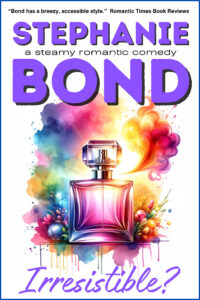
Irresistible? available in ebook and in print).
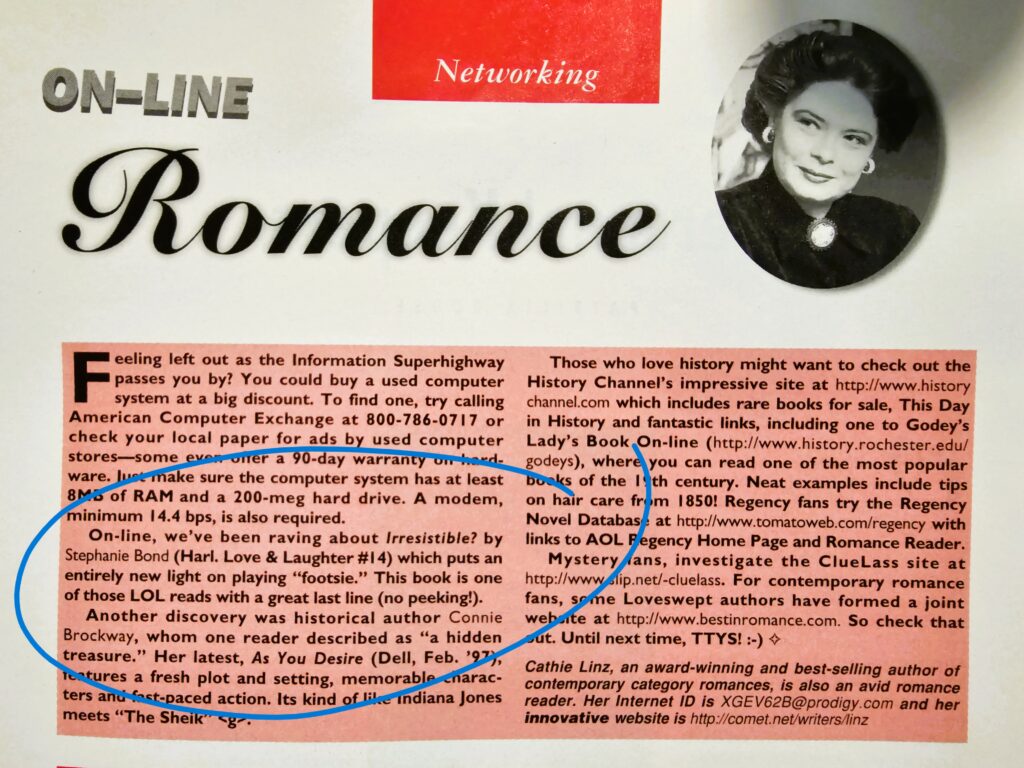
An early reference to Irresistible? in a column called On-Line Romance (the Internet was still new) in Romantic Times magazine written by the wonderful librarian/author Cathie Linz. It was the first I knew about the "buzz" the book was receiving!
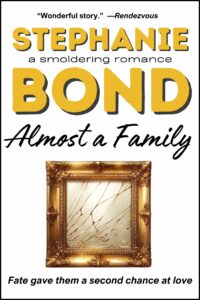
Almost a Family is available everywhere in ebook, print, and audio. This story is the only romance I've written that isn't a comedy.
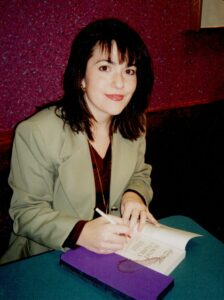
Me signing Almost a Family at a booksigning in 1997.
Also, my Harlequin editor had purchased other book ideas from me. I'd pitched a story about an interior designer who needs to land an account in order to purchase a piece of software that's crucial to her business. But first she visits the home of a client to find his nanny under siege. When the nanny flees, the woman has no choice but to take the kids with her to pitch the owners of the childcare centers. She gets the business because they think she's a mother, and she has to keep the lie going and keep it from their handsome widower dad!
I originally titled the story Mommy-itis, and while the title sounds cute, we realized the word looks confusing when written, so we settled on the title KIDS is a 4-Letter Word.
The rights to KIDS is a 4-Letter Word were recently reverted to me, so I recently revamped it to re-release. (And yes, it needed a lot of work, especially where technological references are concerned!) If you missed KIDS is a 4-Letter Word the first time around or would like to read the updated version, click here to order the ebook or print version.
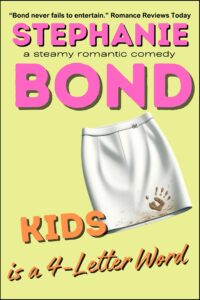
Kids is a 4-Letter Word, newly updated for re-release!
A reader posted a question about how rights to books are reverted, so I'll do my best to explain the process, which varies from publisher to publisher, and can vary from contract to contract. Also, know that contract terms reflect the current state of the industry, so contracts I signed in the mid 1990s differ from contracts offered in subsequent decades. But in general, here's how it works:
When an author finishes writing a book, boom! they have an instant copyright to the material. Legally, the author doesn't have to file/pay to register the copyright with the U.S. Copyright Office, although it's extra protection if the author takes that additional step. Regardless, the copyright is good for the lifetime of the author, plus 70 years. Yes, that's a long, long time and personally, I don't believe most writers realize the ramifications of having an asset that goes on after they pass away.
When an author sells a book to a publisher, we're selling the license to our copyright, for a maximum of 35 years. (The 35-year limit is for books written after 1978; authors have Harper Lee to thank in part for that limitation because To Kill a Mockingbird was bought for $1,000 and would go on to be one of the most successful books ever written, with Lee receiving very little of the overall proceeds. The 35-year limit allows the author to get their rights back and renegotiate its value in the event it's a monster hit and the original contract is no longer fair.) Note also that copyright law differs from country to country. Click here for a link to Wikipedia's writeup concerning Copyright Law in the U.S.
Okay, bear with me—this is a little boring, but it's important for writers and writers' family members to know some basics about rights licensing and rights reversion. And this might help readers understand how different versions of a book can exist over its lifetime.
The contract an author signs typically doesn't spell out the term of the rights license in years. Although Stephen King famously has done this from the beginning of his career and some big-name authors can limit their rights license (for example, to 10 years), the rest of us mere mortal authors agree to an open-end license (up to 35 years as described in the previous paragraph) and rights reversion terms that are set by the publisher. In my early contracts, rights were eligible for reversion when the book went "out of print" or when sales dropped below a certain threshold and a certain amount of time had passed since its release. The evolution of ebooks means a book can no longer logistically be "out of print," but the other terms still apply.
It's up to the author to examine their royalty statements to see when and if a book is eligible for rights reversion. If it is, the author (or the author's agent) sends a letter or email to the publisher's legal department requesting reversion. The request is reviewed and the publisher can either grant the reversion request or repackage and re-release the book within a certain amount of time. Note that if the publisher elects to re-release the book, the terms of reversion are reset. And that process can continue until the 35-year legal limitation is met. But unless a book is a mega bestseller, most publishers recognize that commercial books become dated and un-sellable after a couple of decades, and usually sooner. Note that publishers don't have the right to update books on their own—only the owner of the copyright can meaningfully alter the material. And remember, although the publisher has licensed the copyright, the author is still the owner of the copyright for their lifetime plus 70 years.
This copyright ownership/licensing process also applies to music, although it's more common for songwriters to sell their copyrights, sometimes at the beginning of their career when they have less leverage. When you hear that big name songwriters have sold their song catalog for enormous amounts (Bruce Springsteen, Sting, The Beatles), those deals are copyright buyouts.
So if you're reading this and you're an author who sold to a publisher in the past and you've lost track of your rights, I urge you to look into whether the rights are eligible for reversion. Ditto if you're reading this and you're the heir of an author who has passed. My mind is boggled when I think about the number of books whose rights are simply floating around out there, forgotten and abandoned because the heirs don't know what to do and publishers don't care because it's not their responsibility to keep track of book rights. If the book is still earning royalties, of course those are going to the author's estate, but if a book is so out of date or has been pulled from distribution and isn't earning royalties, it's just lying there, fallow, when it could be generating revenue and allowing the author's name to keep going.
Okay, off my soapbox! And back to transitioning to writing full-time.
I remember the day I woke up and for the first time in my adult life, didn't have to report to a job. It was surreal. I worked on my manuscripts and got my home office organized, but I confess it all felt rather dreamy and it took me a few days to establish a structured writing day.
And I learned rather quickly I had to protect my time! Friends who were still working 9 to 5 would call me when they wanted to kill time and ask how was it, breaking away from the corporate world? Other friends, relatives, and neighbors saw my new status as an opportunity to make me their personal assistant! I would get calls anytime someone needed a favor (because I wasn't really working) and people would drop by unannounced. People expected me to host social events and sign up for neighborhood activities. Also, another phenomenon occurred that people who work from home are acquainted with: suddenly every domestic chore and errand that was previously shared is theirs because they're not really working. And it's so much easier to run to the grocery/drycleaners/post office/tax office during the day than to wait until evening or weekends when it's more crowded. Or mow the lawn in the middle of the day Tuesday to spare the other person from having to do it when they get home. Ditto for cooking and cleaning.
Again, this is difficult to put into words, but it was as if people were trying to punish me for leaving my corporate job to do something creative. And I let people make me feel guilty because it felt so indulgent to me, too, even though I'd worked like mad to slowly transition into writing full-time. I pushed back, but not nearly enough. I was suddenly busier than I'd ever been, trying to write and keep everyone happy. I squeezed in as much writing time as I could during the day. I was still meeting with my critique group once a week, and attending all-day Georgia Romance Writers meetings every month, plus doing booksignings and interviews whenever I could to scare up exposure and publicity.
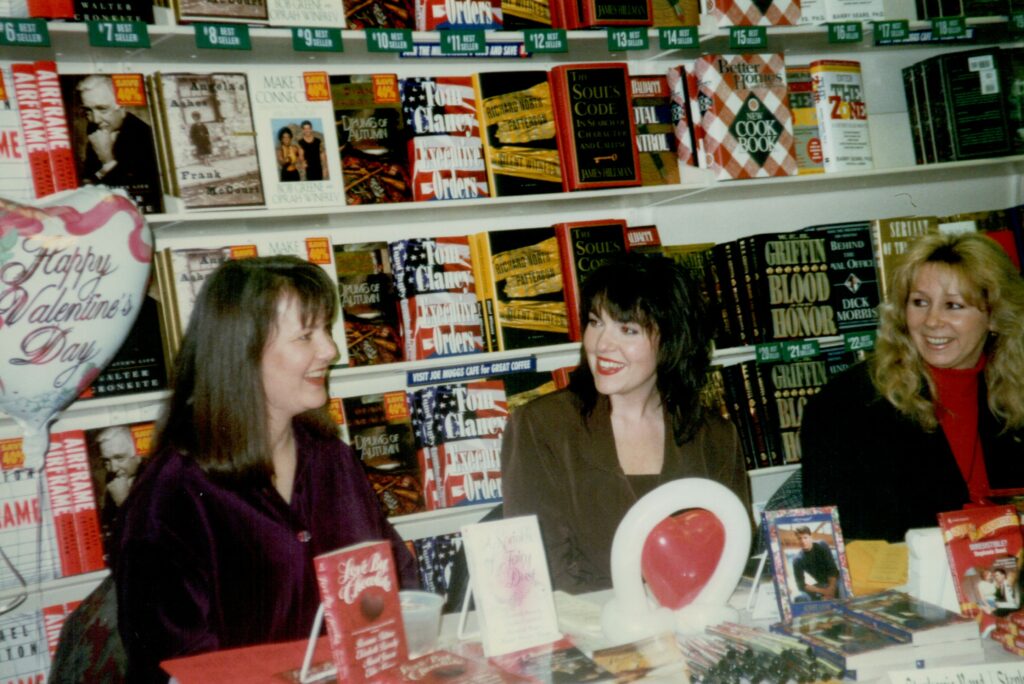
Elizabeth Bevarly, me, and Lori Foster at a Valentine's themed booksigning in Louisville, Kentucky 1997
Unfortunately, I unwittingly set a pace for myself and expectations from others that would eventually come to a head. More about that later. Mostly, though, I look back on those days fondly, when writing was still new and exciting, and I was still finding my way.
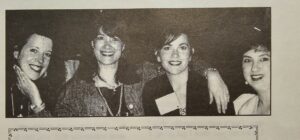
Lyn/Virginia Ellis, Cheryl Anne Porter, me, and Julie Leto at the Moonlight & Magnolias writing conference in Atlanta
A couple of weird things come to mind when I think back to the time after my first books were released. First, the number of sly remarks I received from people who seemed to think I was writing about my own personal experiences! While most authors do draw from things they know about—setting stories in places where they've lived or drawing on jobs they've held, most authors are flying on sheer imagination—that's kind of why we got into this business, because we have so many fictional characters and what-ifs flying through our brains.
Second… I'm trying to figure out the best way to say this… I was flabbergasted then and as my career progressed by the number of people who seemed angry about the fact that I was writing romance novels. I can't count the times someone seemed happy to find out I was a writer, then would ask what I write. When I told them romance novels, they would make a face or recoil—or both—and ask why? And when was I going to write (fill in the blank with a topic they wanted to read about)? (Because my career was all about them.) Those people didn't hide their feelings, but other people would be nicer, would comment had I ever thought about writing other types of books? I would just smile and say no, that I loved reading romance novels, and I loved writing them, too.
Funnily, some people would also go to extremes to point out perceived errors in my books. Don't get me wrong, I make mistakes all the time and I'm grateful when people let me know about story errors so I can correct them, if possible. But I remember one friend who was particularly incensed that I'd made the ginger cat in Irresistible? a female cat—she said that was impossible because all ginger cats were male. That's not true by the way, but I wasn't exactly a cat person back then and Googling wasn't yet a thing, so at the time I really couldn't argue with her. Besides, she was passionate to the point of gleeful about how utterly wrong I was about a detail in my novel, as if that somehow invalidated its publication altogether. Like I said—weird.
Also, some friends would introduce me to others as their author friend, and then whisper behind their hand that I wrote "erotic" novels or "those kinds of books" as a caveat. Someone who was once close to me who shall go unnamed said I wrote "dummy" books. A complete stranger on an airplane once struck up a conversation and then berated me for writing "trash." Honestly, I could go on and on… it was bizarre to me that people seemed to take ownership of my career and felt completely justified in telling me I should be writing something else. In time I would come to realize those people were projecting onto me their own dreams of being a writer that they didn't have the guts to pursue. Or they wanted me to write something more literary so they could show me off as their "lit-rary" friend.
But thankfully, for every turd out there who tried to make me feel less than, there were dozens (hundreds, thousands) of people who were thrilled to learn I wrote books that were for pure entertainment. I personally think we lose a lot of potential readers in high school World Literature class—so many people have an unpleasant relationship with fiction because they were forced to read things they didn't enjoy or relate to. In the U.S., we've created a nation of literate non-readers. When I meet someone who says they don't like to read, I know it's only because they haven't found a book that interests them.
All this to say writing happy books makes me happy and I hope they make my readers happy, too. Life is hard, and if one of my books can distract someone from their problems for a few hours, I'm so pleased. Not everyone can say that about their job. I'm a very fortunate person… and I'm glad that after I took the leap, I kept swimming!
That said, work and life would become much more challenging... ~